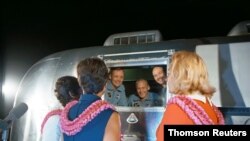A senior female air force officer whose childhood idol was iconic Apollo 11 astronaut Neil Armstrong will become Australia's first space commander.
Air Vice-Marshal Catherine Roberts will oversee the space activities across Australia’s armed forces. Experts have said the army, navy and air force have relied on space-based technologies and communication, and centralized coordination was sensible.
There is growing international competition for supremacy in space. The United States has a military arm called the U.S. Space Force while China and Russia both set up similar units in 2015.
But officials in Canberra have been keen to stress that Australia has no plans to further “militarize space” nor would it seek to build technologies to attack enemy satellites.
A dedicated space command brings Australia into line with Canada, France, India and Japan.
Senior officers have said part of its job would be to establish if satellites used by Australia were under threat or being subjected to accidental interference or natural events.
Air Vice-Marshal Catherine Roberts is a trained engineer, who has served with the Royal Australian Air Force for 35 years. She will take up her position as space commander next year.
In an official RAAF video, she explained how she was inspired by the Apollo 11 moon landing in July 1969.
“Today I wanted to take the opportunity to talk about role models and how important it is for each one of us to pave the way for the next generation as we head into a rapidly accelerating future. The first person I remember ever having a material impact on my ambition was Neil Armstrong. In 1969 as a three-year old I watched on in awe as Lieutenant Armstrong descended the ladder of the lunar lander and uttered the first words ever spoken on the moon. It was an incredible moment for humanity and millions of aspiring engineers that were probably created at that moment. I was no different,” Roberts said.
Last year, the civilian Australian Space Agency officially opened its new headquarters in the city of Adelaide. It is responsible for developing the nation’s multi-billion-dollar commercial space industry. The government believes it will generate 20,000 jobs in Australia by 2030.
Prime minister Scott Morrison has previously estimated the global space economy could be worth more than US$780 billion by 2040, and that Australia needed to be in a position to take advantage of the opportunities.
Analysts have said that as the cost and intricacies of exploiting space have fallen, more countries and businesses are developing and launching the type of surveillance and navigation technology that could have military capabilities.
To this end, experts have said there needs to be close cooperation between the civilian-run Australian Space Agency and the planned new military “space command” division that will be led by Air Vice-Marshal Roberts.




